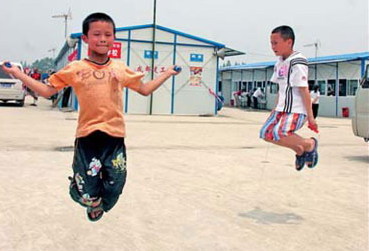Not home, but in happy homeland
By Xie Fang (China Daily)
Updated: 2008-05-28 08:01
Updated: 2008-05-28 08:01
DUJIANGYAN, Sichuan -- Chen Fusen considers himself lucky to be alive, and luckier to be living in a room, instead of a crowded tent.
The 57-year-old pensioner and 915 other quake survivors have just moved into Happy Homeland, the first prefabricated shelter, in Dujiangyan, an hour's drive from Chengdu, provincial capital of Sichuan.
And only three people share a room. So Chen's mother, wife and daughter share one room, while he lives next door.
|
|
His two bicycles are the only valuables he has in the 12-sq-m room. In fact, they are the only valuables he could salvage from his collapsed house. An old wooden cabinet that his friend gave him lies in the middle of the room, and a double bed and a bunk bed are placed side by side.
The new settlement will be spread across 50,000 sq m, more than 10,000 sq m of which was already completed in five days.
Dujiangyan is home to more than 200,000 people, so the entire settlement should be complete by Saturday.
The shelter provides basic but comprehensive facilities, including a school, canteens, supermarkets, clinics, toilets and a police post.
"I just grabbed several quilts and rushed out of my house before it collapsed," says Chen. And though he has just 40 yuan left in his pocket, he shows no signs of worry.
The government has provided the basic articles of daily use, Chen says. Besides, the daily meals are free. "I'm very lucky to be here."
Lan Youcheng, a manager in Happy Homeland, says three kinds of people have been moved into these shelters: those who have lost their homes, those who have lost all their belongings, and those who do not have any income.
The 100-sq-m community kitchen in a canteen has stainless steel utensils. Vegetables, cleaned and processed, are transported from outside. And the city's education bureau, says Lan, has been given the task of maintaining hygienic standards in the kitchen.
Standing in the open and eating from a lunch box, Lan says the homeland's administrators are not allowed to eat in the canteens.
"The main inhabitants of the homeland are elderly people and pensioners ... They will live here for one or two years before being moved to new apartments."
According to experts' appraisals, only 30 percent of the homes are still safe to live in. "We're trying to help as many people as possible to move into them. But the problem is that the number of such houses is too small," Lan says.
The Happy Homeland school opened on May 24, providing education from kindergarten to high school. Already, there are more than 400 students, many of who are from neighboring communities.
Five of the canteens function from classrooms after classes are over because they are the only rooms equipped with fans and TV sets. Each room holds classes for two grades, and the subjects being taught include Chinese, English, maths, sport and music.
Moreover, two psychology counseling classes are held for students every week to help them overcome the trauma. "More than 40 experienced teachers have been selected from across the city to teach here," says Xu Wei, vice-principal of the school.
"Other temporary schools too are under construction in the city, and the local education department is trying to send all the students back to class by the middle of next month," she says.
Eight-year-old Li Yangyang's teacher chose him as a team leader for grade-one on Sunday. Though the little boy does not have any idea why his teacher did so, he is determined to be a role model for the rest of the class.
"I have so much to do. I have to stop my classmates from fighting or talking in class," he says with excitement. "I like my new school because it's a safe place." Medics walk through his classroom spraying disinfectant during the break.
About 62 doctors and nurses, all of them from Dujiangyan No.2 Hospital, are working in Happy Homeland.
And 10 departments are already functioning in the makeshift hospital, including those for women and children, internal medicine and a diagnosis laboratory.
"So far there has been no threat of an epidemic breaking out," says deputy director Deng Xueping.
The hospital was badly damaged in the quake, and they could only grab basic medical equipment from it. "What we need most now are medicines for gynecology and dermatology patients."
A security team, including two community policemen and 10 assistant cops from the local county government, has been formed to guard the homeland. Police say the residents should not worry about how to identify themselves even if they have lost their identification documents.
"They should report to their own community where officials and policemen have already gathered some knowledge about the residents, which will make it easier to identify them, says policeman Zhang Jun. "A temporary identification card will be issued to such residents before their cases are solved permanently."
|
||
|
||
|
|
|
|
